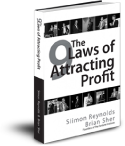
Many of people we encounter in our business coaching seminars believe that entrepreneurial superstars are born, not made.
I beg to differ. Through coaching I mentor hundreds of entrepreneurs every year, from a colossal range of industries, and I believe they all share 7 common character traits.
Importantly, each of these business coaching traits did not exist at birth, they were developed with time, intention and persistence.
Let’s go through these key traits now.
1. REALITY BASED OPTIMISM.
As renowned psychologist Dr Barbara Fredrickson of the University of North Carolina has shown, positivity is a choice- and an exceedingly important one. Those business entrepreneurs with strong inclinations toward positivity are more persistent and effective than entrepreneurs that are pessimistic. See also Martin Seligman’s research on optimism in the insurance industry for mere evidence of the importance of thinking positively. Not a Pollyanna like blind optimism, but an overall positive outlook while accepting current realities.
2. SPEED BORDERING ON THE RECKLESS.
As Mark Zuckerberg famously put it, in these chaotic times executives need to “Move fast and break things”. Slow, methodical improvement can reap dividends of course, but for optimum business growth, those consistent and never ending small improvements need to be matched with an attitude of pushing the envelope of time. Zuckerberg’s theory has always been that if you act quickly you get important feedback, which then enables you to refine your solution rapidly.
3. PEOPLE BEFORE STRATEGY.
When Alan Mulally took over at Ford, the company was in dire straits. While he was ruthless on costs and process, he surprised many at Ford with his equally strong emphasis on looking after staff. At his first major meeting with Ford’s most senior executives, he put up a slide with ten key principles. At the top of the list was ‘People First’. Real progress would only occur, Mulally believed, when top management treated their staff superbly.
4. DATA, DATA, DATA.
Twenty years ago, there were certainly great entrepreneurs winging it- moving fast, but not really evaluating the data. There are very few leaders in business performing that way now however. In every industry the top entrepreneurs have realized that far better decisions are made by gathering maximum data on sales, marketing, pricing, positioning and customer preference. That’s not to say that intuition is no longer important, far from it. But it needs to be balanced with logic formed from empirical intel.
5. GRAND PERSISTENCE.
The biggest myth about successful business people is that they are more intelligent and talented. Having met many super rich entrepreneurs and read over a thousand books on business success I can tell you categorically that, that is not the case. More often the great fortunes have been made by people of average intelligence who had tremendous drive, matched with almost ridiculous levels of persistence. As a high performance expert Denis Waitley expressed it, “Success is almost totally dependent on drive and persistence. The extra energy required to try another effort or another approach is the secret to winning.”
6. CONFIDENT CONTRARIANISM.
It’s hard to make a lot of money in business just doing things a little bit better than your competition. Usually the biggest fortunes have been accrued by taking a vastly different path from other companies in the sector. It takes real confidence to go against the pack. What looks obvious in a decade, often seems absurdly dangerous at the time.
7. LONG TERM TIME PERSPECTIVE.
The get rich quick crowd rarely makes it big in business. Read the biographies of Edison, Ford, Walton, Ellison, Kamprad et alia and you’ll discover tales of the long struggle over decades. Some may have given the impression it was easy, but that is rarely the case. Substantial and enduring business success usually takes a long time- experimenting, failing, then beginning anew with more refined solutions.
(Character trait number two has a curious relationship with trait number seven. The great entrepreneurs act urgently, like they have no time left, yet work like this for decades, making their business successful).
Which of these seven traits do you have? Which do you need to consciously develop more? A few minutes spent evaluating your situation regarding these traits now could reap great dividends in the future.














